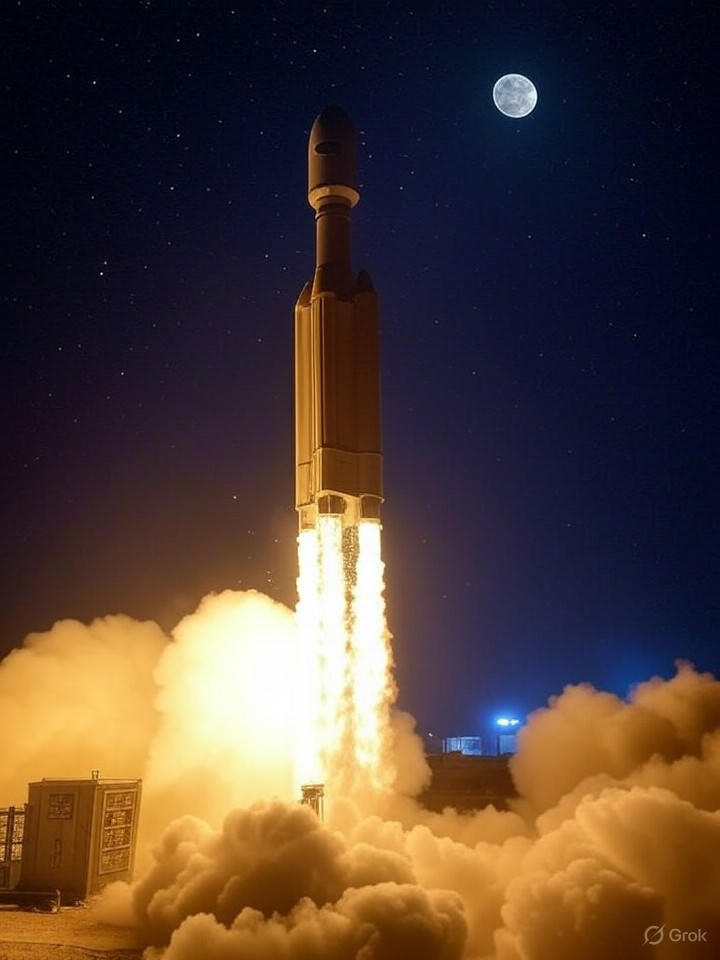Science
AI Transforms Space Operations as Industry Leaders Gather in Seattle

Artificial intelligence (AI) is becoming a pivotal force in the space industry, driving innovations and efficiencies at an unprecedented pace. At a recent summit in Seattle, attended by key industry leaders, discussions revealed how AI technologies are enhancing operations from satellite management to deep-space exploration. Companies such as Blue Origin and SpaceX are integrating machine learning algorithms that optimize rocket trajectories in real time, potentially reducing fuel consumption by up to 15% and lowering mission risks.
The implications of these advancements extend beyond mere operational improvements. AI-driven predictive analytics are now capable of forecasting satellite failures before they occur, utilizing extensive datasets from orbital sensors. Insights shared at the summit indicated that such technologies could prolong the lifespan of satellite constellations like Starlink by several years, translating into savings of billions in replacement costs.
AI’s Role in Autonomous Spacecraft
As missions venture further from Earth, the demand for self-sufficient spacecraft increases. AI plays a crucial role in managing complex decision-making processes without the need for constant human intervention. Beyond physical hardware, AI is revolutionizing the way data is processed in space. Ongoing projects by NASA utilize neural networks to analyze vast amounts of cosmic data, identifying patterns that might elude human analysts. This capability is particularly vital for missions such as the James Webb Space Telescope, where AI algorithms enhance image quality and improve the detection of exoplanets.
Industry experts have noted that private firms are at the forefront of these developments. A report from Lockheed Martin highlights AI’s integration into advanced communication systems, facilitating seamless interactions between ground stations and lunar landers. This is especially relevant for future human exploration missions, where AI could autonomously manage life-support systems during extended stays on the Moon.
Addressing Challenges and Ethical Considerations
While the potential of AI to accelerate space innovation is clear, it also brings challenges such as data security and algorithmic bias. These issues have prompted discussions about the need for robust regulatory frameworks to ensure the safe deployment of AI technologies. Looking forward, the convergence of AI with other advanced fields, such as quantum computing, is set to unlock new possibilities. According to a McKinsey technology trends outlook for 2025, hybrid AI-quantum systems could accurately simulate asteroid mining scenarios, assisting companies in extracting resources from celestial bodies and potentially disrupting traditional mining industries on Earth.
Startups are also exploring the intersection of AI and robotics, with innovative projects focusing on AI-powered drones for orbital debris removal. This initiative addresses the growing concern of space junk, which poses a threat to active satellites.
Investment in AI-driven space ventures is surging, leading analysts to predict significant growth in the sector. Strategic partnerships will be essential for navigating geopolitical tensions and supply chain vulnerabilities. The European Space Agency‘s emphasis on AI highlights a commitment to global collaboration, with initiatives aimed at standardizing AI protocols for international missions. In the United States, policy discussions are intensifying regarding AI’s role in national security, particularly concerning adversarial satellite interference.
As the space industry increasingly embraces AI, the developments showcased at the GeekWire summit signal a transformative shift towards intelligent and adaptive systems. Balancing innovation with oversight will be critical to harnessing AI’s full potential while mitigating any unintended consequences. This confluence of technology and exploration could redefine humanity’s reach into the cosmos, ultimately fostering both economic growth and scientific advancements.
-

 Lifestyle3 months ago
Lifestyle3 months agoLibraries Challenge Rising E-Book Costs Amid Growing Demand
-

 Sports3 months ago
Sports3 months agoTyreek Hill Responds to Tua Tagovailoa’s Comments on Team Dynamics
-

 Sports3 months ago
Sports3 months agoLiverpool Secures Agreement to Sign Young Striker Will Wright
-

 Lifestyle3 months ago
Lifestyle3 months agoSave Your Split Tomatoes: Expert Tips for Gardeners
-

 Lifestyle3 months ago
Lifestyle3 months agoPrincess Beatrice’s Daughter Athena Joins Siblings at London Parade
-

 World3 months ago
World3 months agoWinter Storms Lash New South Wales with Snow, Flood Risks
-

 Science3 months ago
Science3 months agoTrump Administration Moves to Repeal Key Climate Regulation
-

 Science2 months ago
Science2 months agoSan Francisco Hosts Unique Contest to Identify “Performative Males”
-

 Business3 months ago
Business3 months agoSoFi Technologies Shares Slip 2% Following Insider Stock Sale
-

 Science3 months ago
Science3 months agoNew Tool Reveals Link Between Horse Coat Condition and Parasites
-

 Sports3 months ago
Sports3 months agoElon Musk Sculpture Travels From Utah to Yosemite National Park
-

 Science3 months ago
Science3 months agoNew Study Confirms Humans Transported Stonehenge Bluestones









